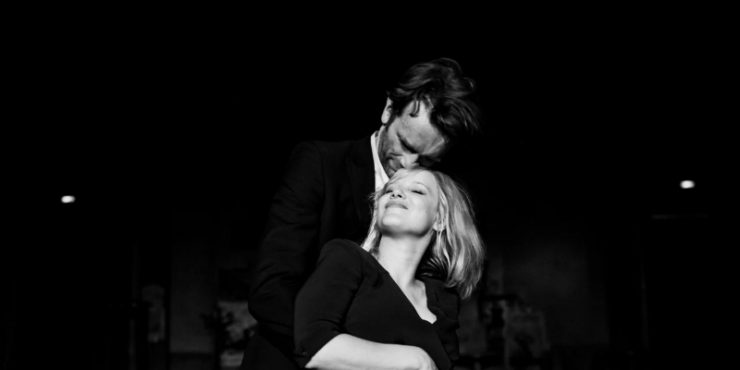The stark, black & white world of Paweł Pawlikowski’s Cold War belies an incredible tenderness, a passionate love that perseveres over years and across countries on both sides of the Berlin Wall. This is not a love story like Barry Jenkins’ If Beale Street Could Talk, which displays a young love mightily extinguishing the hate of the world around it. Pawlikowski’s lovers have a more complicated history, disrupted by political turmoil and nebulous ideas of home. Given a few years, the Beale Street lovers may more closely resemble those in Cold War, when it is revealed that all the strife their love has survived has left some serious scarring.
Wictor (Tomasz Kot) is a talented musician and conductor living in Soviet Poland just after the war. He is a leading member of a group interested in producing home-grown musical entertainment, focused primarily on peasant folk. In the desolate, unpleasant times of early Stalinist rule, Wictor and party hope to present carefree entertainment for their common man. This is where he meets Zuna (Joanna Kulig), a singer who tries out and gets accepted into their group. There are better singers than Zuna, but Wictor thinks she has that extra something. The interest proves mutual as the two begin a passionate affair. When the group is propositioned by the government to perform more party-friendly material, they decide it’s time to flee to France.
Things get tricky after that. Wictor makes it out of communist Poland only to find that Zuna has stayed behind. Their lives evolve without each other, only to come crashing back together at various times, over several years, their relationship succeeding and failing for an assortment of reasons. That they love each other is never the question, it’s a matter of what the love can sustain, and too often they find themselves torn apart by forces too great to overcome. Their love is said to be inspired by the actual love story of Pawlikowski’s parents, but the Oscar-winning director tinges Cold War with a stunning flair for melodrama, giving the romance the proper stakes and tragic proportions.
Like his previous film, Ida, Cold War is framed in a squared-off 4:3 aspect ratio. Paul Schrader did the same thing earlier this year with First Reformed. Schrader was attempting to create claustrophobia in his film about bubbling inner torment. Pawlikowski, on the other hand, fills the truncated frame with expansive views of snow-covered, post-war desolation. His use of negative space (cinematography by Łukasz Zal) not only gives visual context to the oppression of Stalin’s regime, but illustrates Wictor and Zuna’s lack of wholeness without each other. The sharp black & white as well as Jaroslaw Kaminski’s choppy editing creates a timeless quality to this powerful love story.
Cold War is filled with sentimental credence for Pawlikowski’s home country, Poland, a bystander in a much larger conflict between much larger, much more notorious nations. The film is filled almost completely with music, from folk to jazz, and Kot gets to show off an impressive talent on the piano. The performances from Kot and Kulig are a perfect contrast of hot and cold, with Wictor’s simmering desires brushing up against Zuna’s tempestuous insecurity. The two veteran actors understand the different ways in which these people have been damaged by the years of martial intimidation. That said, Cold War is a love story, and its triumph is how Wictor and Zuna continue to find one another.
Directed by Paweł Pawlikowski










